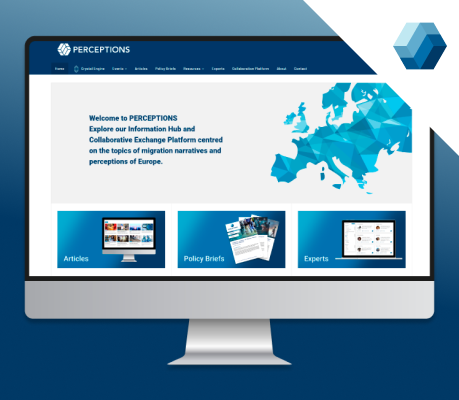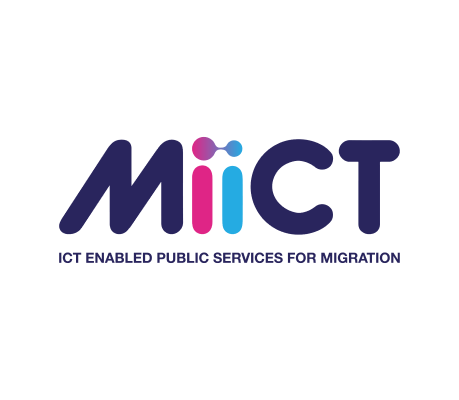Project reference
Das Projekt Migration Ties wird im Sicherheitsforschungs-Förderprogramm KIRAS des Bundesministeriums für Landwirtschaft, Regionen und Tourismus finanziert.
Projektnummer: 879680

Das Projekt Migration Ties wird im Sicherheitsforschungs-Förderprogramm KIRAS des Bundesministeriums für Landwirtschaft, Regionen und Tourismus finanziert.
Projektnummer: 879680
The PERCEPTIONS project aims to identify and understand narratives, imaginations and (mis-)perceptions of the EU – held outside of Europe – and the way they are distributed via various channels. Furthermore, the project investigates how the information flow might be distorted and how a mismatch of expectations and reality caused by certain narratives might lead to security threats.
The main objectives of the PERCEPTIONS project are to (1) identify narratives, images and perceptions of Europe abroad, (2) investigate how different narratives could lead to problems, unrealistic expectations, security threats or even radicalisation in what way; and (3) create toolkits of creative and innovative measures to react or even counteract on them, considering social, societal and structural aspects.
Previous research suggests that perceptions on Europe are formed in the country of residence, and they are based on a multitude of sources; and factors influencing migration are on different levels – from the overall socio-economic situation in a country to perceptions on educational opportunities and gender equality.
Social media and new communication networks, in addition, have increased the scope and the intensity of distribution of a variety of narratives; and furthermore, so-called filter bubbles and echo chambers can lead to one-sided narratives that go uncorrected. Due to new communication technologies, claims can take on a life of their own, and might raise unrealistic expectations or disapproval. At the same time, however, technologies and communication networks might also provide a channel to avoid a mismatch of expectation and reality and to promote the desired narratives.
 https://www.synyo.com/wp-content/uploads/SYNYO-NEWS-featured-image-NEW01005008EN.png
400
459
leo
https://www.synyo.com/wp-content/uploads/2017/09/synyo-logo.png
leo2023-02-28 08:54:202025-03-25 09:21:52PERCEPTIONS: Recommendation strategies, tools and guidelines for policymakers
https://www.synyo.com/wp-content/uploads/SYNYO-NEWS-featured-image-NEW01005008EN.png
400
459
leo
https://www.synyo.com/wp-content/uploads/2017/09/synyo-logo.png
leo2023-02-28 08:54:202025-03-25 09:21:52PERCEPTIONS: Recommendation strategies, tools and guidelines for policymakers https://www.synyo.com/wp-content/uploads/SYNYO-NEWS-featured-image-NEW01005007EN.png
400
459
leo
https://www.synyo.com/wp-content/uploads/2017/09/synyo-logo.png
leo2022-09-30 10:10:142025-03-25 08:47:32PERCEPTIONS: Recommendation strategies, tools and guidelines for policymakers
https://www.synyo.com/wp-content/uploads/SYNYO-NEWS-featured-image-NEW01005007EN.png
400
459
leo
https://www.synyo.com/wp-content/uploads/2017/09/synyo-logo.png
leo2022-09-30 10:10:142025-03-25 08:47:32PERCEPTIONS: Recommendation strategies, tools and guidelines for policymakers https://www.synyo.com/wp-content/uploads/SYNYO-NEWS-featured-image-NEW01005006EN.png
400
459
leo
https://www.synyo.com/wp-content/uploads/2017/09/synyo-logo.png
leo2022-03-01 09:28:552025-03-25 08:47:50PERCEPTIONS: Web platform launched, first policy briefs published and creative awareness activities conducted
https://www.synyo.com/wp-content/uploads/SYNYO-NEWS-featured-image-NEW01005006EN.png
400
459
leo
https://www.synyo.com/wp-content/uploads/2017/09/synyo-logo.png
leo2022-03-01 09:28:552025-03-25 08:47:50PERCEPTIONS: Web platform launched, first policy briefs published and creative awareness activities conducted https://www.synyo.com/wp-content/uploads/SYNYO-NEWS-featured-image-NEW01003607EN.png
400
459
leo
https://www.synyo.com/wp-content/uploads/2017/09/synyo-logo.png
leo2022-01-30 09:02:092025-03-27 09:02:53MIICT: Final conference on co-creating ICT solutions to aid migrant integration
https://www.synyo.com/wp-content/uploads/SYNYO-NEWS-featured-image-NEW01003607EN.png
400
459
leo
https://www.synyo.com/wp-content/uploads/2017/09/synyo-logo.png
leo2022-01-30 09:02:092025-03-27 09:02:53MIICT: Final conference on co-creating ICT solutions to aid migrant integration https://www.synyo.com/wp-content/uploads/SYNYO-NEWS-featured-image-NEW01005005EN.png
400
459
SYNYO
https://www.synyo.com/wp-content/uploads/2017/09/synyo-logo.png
SYNYO2021-09-05 19:05:252022-02-04 15:08:23PERCEPTIONS: First insights into first-line practitioners’ perspectives on migration to the EU published
https://www.synyo.com/wp-content/uploads/SYNYO-NEWS-featured-image-NEW01005005EN.png
400
459
SYNYO
https://www.synyo.com/wp-content/uploads/2017/09/synyo-logo.png
SYNYO2021-09-05 19:05:252022-02-04 15:08:23PERCEPTIONS: First insights into first-line practitioners’ perspectives on migration to the EU published https://www.synyo.com/wp-content/uploads/SYNYO-NEWS-featured-image-NEW01003606EN.png
400
459
leo
https://www.synyo.com/wp-content/uploads/2017/09/synyo-logo.png
leo2021-07-01 09:24:472025-03-21 09:25:16MIICT: Co-Created IMMERSE platform for public service access transformation and migrant integration
https://www.synyo.com/wp-content/uploads/SYNYO-NEWS-featured-image-NEW01003606EN.png
400
459
leo
https://www.synyo.com/wp-content/uploads/2017/09/synyo-logo.png
leo2021-07-01 09:24:472025-03-21 09:25:16MIICT: Co-Created IMMERSE platform for public service access transformation and migrant integration https://www.synyo.com/wp-content/uploads/SYNYO-NEWS-featured-image-NEW01005004EN.png
400
459
SYNYO
https://www.synyo.com/wp-content/uploads/2017/09/synyo-logo.png
SYNYO2021-03-04 08:11:472022-02-04 14:56:15PERCEPTIONS: Interviews and focus groups with migrants and practitioners in 14 countries started
https://www.synyo.com/wp-content/uploads/SYNYO-NEWS-featured-image-NEW01005004EN.png
400
459
SYNYO
https://www.synyo.com/wp-content/uploads/2017/09/synyo-logo.png
SYNYO2021-03-04 08:11:472022-02-04 14:56:15PERCEPTIONS: Interviews and focus groups with migrants and practitioners in 14 countries started https://www.synyo.com/wp-content/uploads/SYNYO-NEWS-featured-image-NEW01003605EN.png
400
459
SYNYO
https://www.synyo.com/wp-content/uploads/2017/09/synyo-logo.png
SYNYO2021-01-09 05:59:092021-07-08 14:06:15MIICT: Developing policy recommendations for improving migrant integration in Europe
https://www.synyo.com/wp-content/uploads/SYNYO-NEWS-featured-image-NEW01003605EN.png
400
459
SYNYO
https://www.synyo.com/wp-content/uploads/2017/09/synyo-logo.png
SYNYO2021-01-09 05:59:092021-07-08 14:06:15MIICT: Developing policy recommendations for improving migrant integration in Europe https://www.synyo.com/wp-content/uploads/SYNYO-NEWS-featured-image-NEW01005003EN.png
400
459
SYNYO
https://www.synyo.com/wp-content/uploads/2017/09/synyo-logo.png
SYNYO2020-09-11 17:50:272022-02-04 14:49:40PERCEPTIONS: Start of the empirical research: survey with practitioners across and beyond Europe
https://www.synyo.com/wp-content/uploads/SYNYO-NEWS-featured-image-NEW01005003EN.png
400
459
SYNYO
https://www.synyo.com/wp-content/uploads/2017/09/synyo-logo.png
SYNYO2020-09-11 17:50:272022-02-04 14:49:40PERCEPTIONS: Start of the empirical research: survey with practitioners across and beyond Europe https://www.synyo.com/wp-content/uploads/SYNYO-NEWS-featured-Image-NEW01003404EN.png
400
459
leo
https://www.synyo.com/wp-content/uploads/2017/09/synyo-logo.png
leo2020-07-31 09:01:222025-04-17 09:02:04Counter Stories: Alternative stories, videos and materials for primary police prevention
https://www.synyo.com/wp-content/uploads/SYNYO-NEWS-featured-Image-NEW01003404EN.png
400
459
leo
https://www.synyo.com/wp-content/uploads/2017/09/synyo-logo.png
leo2020-07-31 09:01:222025-04-17 09:02:04Counter Stories: Alternative stories, videos and materials for primary police prevention https://www.synyo.com/wp-content/uploads/SYNYO-NEWS-featured-image-NEW01003604EN.png
400
459
SYNYO
https://www.synyo.com/wp-content/uploads/2017/09/synyo-logo.png
SYNYO2020-07-06 17:23:312021-07-08 13:56:55MIICT: Defining the design frames for the IMMERSE platform development and implementation
https://www.synyo.com/wp-content/uploads/SYNYO-NEWS-featured-image-NEW01003604EN.png
400
459
SYNYO
https://www.synyo.com/wp-content/uploads/2017/09/synyo-logo.png
SYNYO2020-07-06 17:23:312021-07-08 13:56:55MIICT: Defining the design frames for the IMMERSE platform development and implementation https://www.synyo.com/wp-content/uploads/SYNYO-NEWS-featured-image-NEW01005002EN.png
400
459
SYNYO
https://www.synyo.com/wp-content/uploads/2017/09/synyo-logo.png
SYNYO2020-03-05 08:15:492022-02-04 14:14:52PERCEPTIONS: Understanding research on migration narratives and the role of perceptions in migration policies
https://www.synyo.com/wp-content/uploads/SYNYO-NEWS-featured-image-NEW01005002EN.png
400
459
SYNYO
https://www.synyo.com/wp-content/uploads/2017/09/synyo-logo.png
SYNYO2020-03-05 08:15:492022-02-04 14:14:52PERCEPTIONS: Understanding research on migration narratives and the role of perceptions in migration policies https://www.synyo.com/wp-content/uploads/SYNYO-NEWS-featured-image-NEW01003603EN.png
400
459
SYNYO
https://www.synyo.com/wp-content/uploads/2017/09/synyo-logo.png
SYNYO2020-01-04 07:33:272021-07-08 13:48:54MIICT: Requirements elicitation, co-creation and participatory design with migrants in Italy, Spain and Cyprus
https://www.synyo.com/wp-content/uploads/SYNYO-NEWS-featured-image-NEW01003603EN.png
400
459
SYNYO
https://www.synyo.com/wp-content/uploads/2017/09/synyo-logo.png
SYNYO2020-01-04 07:33:272021-07-08 13:48:54MIICT: Requirements elicitation, co-creation and participatory design with migrants in Italy, Spain and Cyprus https://www.synyo.com/wp-content/uploads/SYNYO-NEWS-featured-image-PERCEPTIONS-02.png
400
459
SYNYO
https://www.synyo.com/wp-content/uploads/2017/09/synyo-logo.png
SYNYO2019-12-06 10:08:132021-08-09 15:10:11Start of the H2020 project PERCEPTIONS – Understanding the Impact of New Technologies and Social Media on Perceptions of Europe in Countries Abroad
https://www.synyo.com/wp-content/uploads/SYNYO-NEWS-featured-image-PERCEPTIONS-02.png
400
459
SYNYO
https://www.synyo.com/wp-content/uploads/2017/09/synyo-logo.png
SYNYO2019-12-06 10:08:132021-08-09 15:10:11Start of the H2020 project PERCEPTIONS – Understanding the Impact of New Technologies and Social Media on Perceptions of Europe in Countries Abroad https://www.synyo.com/wp-content/uploads/SYNYO-NEWS-featured-Image-NEW01003403EN.png
400
459
leo
https://www.synyo.com/wp-content/uploads/2017/09/synyo-logo.png
leo2019-10-31 09:23:112025-04-16 09:23:37Counter Stories: Analysis of extremist narratives and pedagogical principles for early prevention
https://www.synyo.com/wp-content/uploads/SYNYO-NEWS-featured-Image-NEW01003403EN.png
400
459
leo
https://www.synyo.com/wp-content/uploads/2017/09/synyo-logo.png
leo2019-10-31 09:23:112025-04-16 09:23:37Counter Stories: Analysis of extremist narratives and pedagogical principles for early prevention https://www.synyo.com/wp-content/uploads/SYNYO-NEWS-featured-Image-NEW01003402EN.png
400
459
leo
https://www.synyo.com/wp-content/uploads/2017/09/synyo-logo.png
leo2019-05-01 09:45:422025-04-15 09:46:03Counter Stories: Evaluation of alternative narratives in the national and international context
https://www.synyo.com/wp-content/uploads/SYNYO-NEWS-featured-Image-NEW01003402EN.png
400
459
leo
https://www.synyo.com/wp-content/uploads/2017/09/synyo-logo.png
leo2019-05-01 09:45:422025-04-15 09:46:03Counter Stories: Evaluation of alternative narratives in the national and international context https://www.synyo.com/wp-content/uploads/SYNYO-NEWS-featured-image-NEW01003601EN-1.png
400
459
SYNYO
https://www.synyo.com/wp-content/uploads/2017/09/synyo-logo.png
SYNYO2018-11-22 11:41:002021-08-10 08:55:35MIICT Project Kickoff Meeting
https://www.synyo.com/wp-content/uploads/SYNYO-NEWS-featured-image-NEW01003601EN-1.png
400
459
SYNYO
https://www.synyo.com/wp-content/uploads/2017/09/synyo-logo.png
SYNYO2018-11-22 11:41:002021-08-10 08:55:35MIICT Project Kickoff Meeting https://www.synyo.com/wp-content/uploads/SYNYO-NEWS-featured-image-Counterstories-0.1.png
400
459
SYNYO
https://www.synyo.com/wp-content/uploads/2017/09/synyo-logo.png
SYNYO2018-11-22 11:32:402021-08-10 08:58:15New KIRAS-project Counter Stories has started
https://www.synyo.com/wp-content/uploads/SYNYO-NEWS-featured-image-Counterstories-0.1.png
400
459
SYNYO
https://www.synyo.com/wp-content/uploads/2017/09/synyo-logo.png
SYNYO2018-11-22 11:32:402021-08-10 08:58:15New KIRAS-project Counter Stories has started https://www.synyo.com/wp-content/uploads/SYNYO-NEWS-featured-image-Counterstories-0.2.png
400
459
SYNYO
https://www.synyo.com/wp-content/uploads/2017/09/synyo-logo.png
SYNYO2018-11-04 12:27:542021-08-10 09:19:14Counter Stories: Radicalisation prevention and resilience building through alternative narratives
https://www.synyo.com/wp-content/uploads/SYNYO-NEWS-featured-image-Counterstories-0.2.png
400
459
SYNYO
https://www.synyo.com/wp-content/uploads/2017/09/synyo-logo.png
SYNYO2018-11-04 12:27:542021-08-10 09:19:14Counter Stories: Radicalisation prevention and resilience building through alternative narratives https://www.synyo.com/wp-content/uploads/SYNYO-NEWS-featured-image-NEW01003601EN.png
400
459
SYNYO
https://www.synyo.com/wp-content/uploads/2017/09/synyo-logo.png
SYNYO2018-11-01 08:44:582021-02-02 10:49:03MIICT: Co-creating new ICT-enabled services for migrant integration and migration management
https://www.synyo.com/wp-content/uploads/SYNYO-NEWS-featured-image-NEW01003601EN.png
400
459
SYNYO
https://www.synyo.com/wp-content/uploads/2017/09/synyo-logo.png
SYNYO2018-11-01 08:44:582021-02-02 10:49:03MIICT: Co-creating new ICT-enabled services for migrant integration and migration management https://www.synyo.com/wp-content/uploads/SYNYO-NEWS-featured-image-NEW01003602EN.png
400
459
SYNYO
https://www.synyo.com/wp-content/uploads/2017/09/synyo-logo.png
SYNYO2018-07-29 08:29:392021-07-08 13:33:22MIICT: Following the “inclusivity by design” principle for IMMERSE through the inclusivity handbook
https://www.synyo.com/wp-content/uploads/SYNYO-NEWS-featured-image-NEW01003602EN.png
400
459
SYNYO
https://www.synyo.com/wp-content/uploads/2017/09/synyo-logo.png
SYNYO2018-07-29 08:29:392021-07-08 13:33:22MIICT: Following the “inclusivity by design” principle for IMMERSE through the inclusivity handbook
 ResilienceWorks
ResilienceWorks | Cookie | Duration | Description |
|---|---|---|
| cookielawinfo-checkbox-analytics | 11 months | This cookie is set by GDPR Cookie Consent plugin. The cookie is used to store the user consent for the cookies in the category "Analytics". |
| cookielawinfo-checkbox-functional | 11 months | The cookie is set by GDPR cookie consent to record the user consent for the cookies in the category "Functional". |
| cookielawinfo-checkbox-necessary | 11 months | This cookie is set by GDPR Cookie Consent plugin. The cookies is used to store the user consent for the cookies in the category "Necessary". |
| cookielawinfo-checkbox-others | 11 months | This cookie is set by GDPR Cookie Consent plugin. The cookie is used to store the user consent for the cookies in the category "Other. |
| cookielawinfo-checkbox-performance | 11 months | This cookie is set by GDPR Cookie Consent plugin. The cookie is used to store the user consent for the cookies in the category "Performance". |
| viewed_cookie_policy | 11 months | The cookie is set by the GDPR Cookie Consent plugin and is used to store whether or not user has consented to the use of cookies. It does not store any personal data. |

PERCEPTIONS
/0 Comments/in PERCEPTIONS, Projects /by SYNYOUnderstand the Dimenstions of Organised Crime and Terrorist Networks for Developing Effective and Efficient Security Solutions for First-line-practitioners and Professionals
AWID
/0 Comments/in AWID, Projects /by SYNYODas Kernziel des zweijährigen Forschungs- und Entwicklungsprojekts AWID bezieht sich auf die Unterstützung von ausgewählten, relevanten, innovativen und spezifischen Maßnahmen zur Prävention und Deradikalisierung von diversen Abwertungseinstellungen.
MIICT
/0 Comments/in MIICT, Projects /by SYNYOIoThreats addresses the increasing vulnerability of a variety of systems in the fields of the Internet of Things (IoT), such as Smart Grid, Connected Car, Industry 4.0, Active and Assisted Living (AAL), Telemedicine and others.